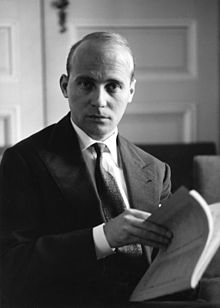Phaedra (opera)
| Phaedra | |
|---|---|
| Opera by Hans Werner Henze | |

The composer in 1960
|
|
| Description | concert opera |
| Librettist | Christian Lehnert |
| Language | German |
| Based on | Phaedra, by several authors |
| Premiere | 6 September 2007 Berlin State Opera |
Phaedra is a 'concert opera' in two-acts by Hans Werner Henze. Its first performance was given at the Berlin State Opera on 6 September 2007. The work is a co-commission and co-production with the Berliner Festspiele, Théâtre de la Monnaie, Brussels, Alte Oper Frankfurt and the Vienna Festival.
Although Henze announced in 2003 that L'Upupa und der Triumph der Sohnesliebe would be his last opera, it became known during 2006 that in spite of serious illness, he was preparing a new opera based on the classical myth of Phaedra.
The libretto is by Christian Lehnert and deals in an innovative way with the story of Phaedra, whose love for her stepson Hippolytus triggers catastrophe. The first part of the opera tells this legend much as previously retold by Euripides, Racine and Sarah Kane. The second part, however, follows a mythological tradition alluded to by Ovid. Hippolytus, fatally wounded, is brought back to life by the goddess Artemis, and is given a new life under the name of Virbius. In this new existence, however, he is only able to experience his own consciousness in a fragmentary, kaleidoscopic way.
The first act is rooted in Greece, and Greek myth. The second, composed after Henze's collapse and two-month coma, is set in Nemi, near Henze's home in Italy, and the location of the ancient cult and priesthood of Virbius (which inspired Sir James Frazer to write The Golden Bough). As the struggles of the goddesses and the identity of Hippolyt become gradually more and more abstract and remote, the wholeness of nature reasserts itself, and the Minotaur, in Henze's words, "proclaims a kind of freedom, the spring comes... into the world and the woods." In its latter stages, the opera seems to abstract itself even from the stage, treading "a metaphysical tightrope between this world and the next, effortlessly invoking a porous divide between the living and the dead. The opera’s end is both transcendental and inconclusive: 'We are all born naked. We press towards mortality and dance,' sings the Minotaur in his final hymn."
...
Wikipedia
